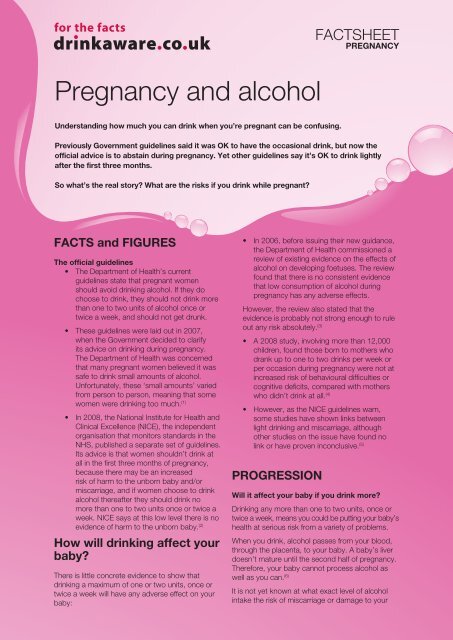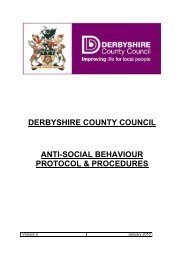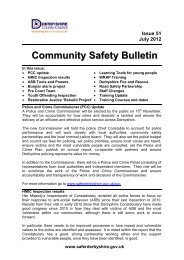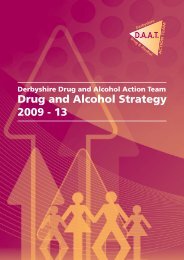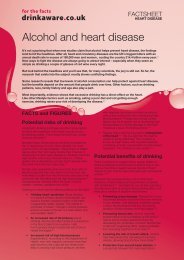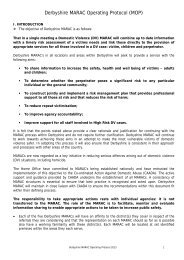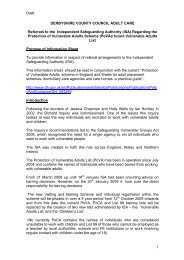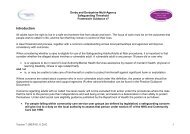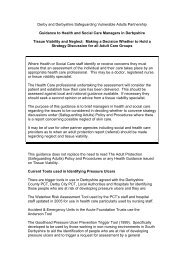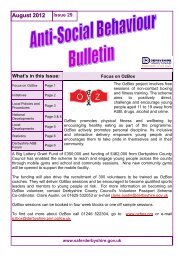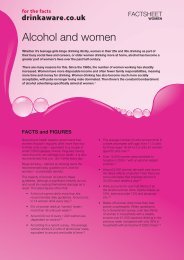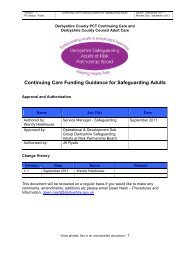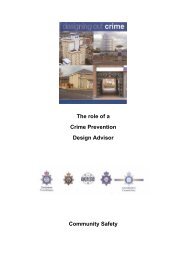Drinkaware Factsheet alcohol and pregnancy - Safer Derbyshire
Drinkaware Factsheet alcohol and pregnancy - Safer Derbyshire
Drinkaware Factsheet alcohol and pregnancy - Safer Derbyshire
Create successful ePaper yourself
Turn your PDF publications into a flip-book with our unique Google optimized e-Paper software.
FACTSHEET<br />
PREGNANCY<br />
Pregnancy <strong>and</strong> <strong>alcohol</strong><br />
Underst<strong>and</strong>ing how much you can drink when you’re pregnant can be confusing.<br />
Previously Government guidelines said it was OK to have the occasional drink, but now the<br />
official advice is to abstain during <strong>pregnancy</strong>. Yet other guidelines say it’s OK to drink lightly<br />
after the first three months.<br />
So what’s the real story? What are the risks if you drink while pregnant?<br />
FACTS <strong>and</strong> FIGURES<br />
The official guidelines<br />
• The Department of Health’s current<br />
guidelines state that pregnant women<br />
should avoid drinking <strong>alcohol</strong>. If they do<br />
choose to drink, they should not drink more<br />
than one to two units of <strong>alcohol</strong> once or<br />
twice a week, <strong>and</strong> should not get drunk.<br />
• These guidelines were laid out in 2007,<br />
when the Government decided to clarify<br />
its advice on drinking during <strong>pregnancy</strong>.<br />
The Department of Health was concerned<br />
that many pregnant women believed it was<br />
safe to drink small amounts of <strong>alcohol</strong>.<br />
Unfortunately, these ‘small amounts’ varied<br />
from person to person, meaning that some<br />
women were drinking too much. (1)<br />
• In 2008, the National Institute for Health <strong>and</strong><br />
Clinical Excellence (NICE), the independent<br />
organisation that monitors st<strong>and</strong>ards in the<br />
NHS, published a separate set of guidelines.<br />
Its advice is that women shouldn’t drink at<br />
all in the first three months of <strong>pregnancy</strong>,<br />
because there may be an increased<br />
risk of harm to the unborn baby <strong>and</strong>/or<br />
miscarriage, <strong>and</strong> if women choose to drink<br />
<strong>alcohol</strong> thereafter they should drink no<br />
more than one to two units once or twice a<br />
week. NICE says at this low level there is no<br />
evidence of harm to the unborn baby. (2)<br />
How will drinking affect your<br />
baby?<br />
There is little concrete evidence to show that<br />
drinking a maximum of one or two units, once or<br />
twice a week will have any adverse effect on your<br />
baby:<br />
• In 2006, before issuing their new guidance,<br />
the Department of Health commissioned a<br />
review of existing evidence on the effects of<br />
<strong>alcohol</strong> on developing foetuses. The review<br />
found that there is no consistent evidence<br />
that low consumption of <strong>alcohol</strong> during<br />
<strong>pregnancy</strong> has any adverse effects.<br />
However, the review also stated that the<br />
evidence is probably not strong enough to rule<br />
out any risk absolutely. (3)<br />
• A 2008 study, involving more than 12,000<br />
children, found those born to mothers who<br />
drank up to one to two drinks per week or<br />
per occasion during <strong>pregnancy</strong> were not at<br />
increased risk of behavioural difficulties or<br />
cognitive deficits, compared with mothers<br />
who didn’t drink at all. (4)<br />
• However, as the NICE guidelines warn,<br />
some studies have shown links between<br />
light drinking <strong>and</strong> miscarriage, although<br />
other studies on the issue have found no<br />
link or have proven inconclusive. (5)<br />
PROGRESSION<br />
Will it affect your baby if you drink more?<br />
Drinking any more than one to two units, once or<br />
twice a week, means you could be putting your baby’s<br />
health at serious risk from a variety of problems.<br />
When you drink, <strong>alcohol</strong> passes from your blood,<br />
through the placenta, to your baby. A baby’s liver<br />
doesn’t mature until the second half of <strong>pregnancy</strong>.<br />
Therefore, your baby cannot process <strong>alcohol</strong> as<br />
well as you can. (6)<br />
It is not yet known at what exact level of <strong>alcohol</strong><br />
intake the risk of miscarriage or damage to your
FACTSHEET<br />
PREGNANCY<br />
baby starts to increase. But if you drink more than<br />
the recommended guidelines, you are taking a risk<br />
with your baby’s health. The more you drink, the<br />
more of a risk you are taking.<br />
• Miscarriage, stillbirth, premature birth <strong>and</strong><br />
small birth weight have all been associated<br />
with the mother binge drinking. (7) Binge<br />
drinking in women is defined as drinking<br />
more than six units on one occasion.<br />
• Other effects of drinking heavily in<br />
<strong>pregnancy</strong> include Fetal Alcohol Spectrum<br />
Disorder (FASD). Around 6,000 children are<br />
born with FASD each year. (8) Symptoms of<br />
FASD include:<br />
- Learning difficulties, problems with emotional<br />
development <strong>and</strong> behaviour, memory <strong>and</strong><br />
attention deficits, hyperactivity, difficulty<br />
in organising <strong>and</strong> planning, <strong>and</strong> problems<br />
with language<br />
- Facial deformities<br />
- Being small, at birth <strong>and</strong> throughout life<br />
- Poor muscle tone<br />
- As a result of their difficulties with learning,<br />
judgement, planning <strong>and</strong> memory, people<br />
with FASD may experience additional<br />
problems. These include psychiatric<br />
problems, a disrupted education, trouble<br />
with the law, <strong>alcohol</strong> <strong>and</strong> drug problems,<br />
<strong>and</strong> inappropriate sexual behaviour. (9)<br />
Children with FASD can have one or several of<br />
these symptoms. Children who display all of the<br />
symptoms are defined as having Fetal Alcohol<br />
Syndrome (FAS). (10)<br />
How a baby will be affected depends on how<br />
much its mother drinks <strong>and</strong> at what point in her<br />
<strong>pregnancy</strong>. For example, damage to the organs<br />
through heavy drinking is most likely to happen in<br />
the first three months. (11)<br />
ADVICE <strong>and</strong> GETTING HELP<br />
Although the healthiest option is to not to drink at<br />
all while pregnant, if you drink no more than one<br />
to two units, no more than once or twice a week,<br />
the risk of harming your baby is minimal.<br />
However, if you do drink, it is extremely<br />
important that you realise what a unit of <strong>alcohol</strong><br />
actually is. One drink is hardly ever just one unit.<br />
Even a small (125ml) glass of wine or a half pint of<br />
st<strong>and</strong>ard beer has one-<strong>and</strong>-a-half units.<br />
Our unit calculator www.drinkaware.co.uk/tips<strong>and</strong>-tools/drink-diary<br />
has all the information about<br />
how many units are in different measures of<br />
different drinks <strong>and</strong> br<strong>and</strong>s.<br />
What if you didn’t know you were pregnant<br />
<strong>and</strong> have been drinking?<br />
The Government advises that if you’re trying for<br />
a baby, you should stop drinking to avoid this<br />
situation. However, a lot of women drink in the<br />
early stages of their <strong>pregnancy</strong> – sometimes<br />
heavily – before they know they’re expecting. Stop<br />
as soon as you find out <strong>and</strong> if you’re concerned at<br />
all talk to your GP or midwife.<br />
For more information <strong>and</strong> advice on Fetal Alcohol<br />
Syndrome or Spectrum Disorder, go to the<br />
National Organisation on Fetal Alcohol Syndrome<br />
UK’s website, www.nofas-uk.org, or call their<br />
helpline on 08700 333 700.<br />
References<br />
1 Department of Health, Updated <strong>alcohol</strong> advice for pregnant women, http://nds.<br />
coi.gov.uk/environment/fullDetail.asp?ReleaseID=287152&NewsAreaID=2&Navig<br />
atedFromDepartment=False<br />
2 NICE, Antenatal care: Routine care for the healthy pregnant woman, http://www.<br />
nice.org.uk/nicemedia/pdf/CG062NICEguideline.pdf<br />
3 Gray, R & <strong>and</strong> Henderson, J 2006, Report to the Department of Health: Review<br />
of the fetal effects of prenatal <strong>alcohol</strong> exposure from the National Perinatal<br />
Epidemiology Unit, University of Oxford, May http://www.npeu.ox.ac.uk/<br />
downloads/reports/<strong>alcohol</strong>-report.pdf<br />
4 Kelly, Y, Sacker, A, Gray, R, Kelly, J, Wolke, D & Quigley, M 2008, ‘Light drinking<br />
in <strong>pregnancy</strong>: A risk for behavioural problems <strong>and</strong> cognitive deficits at three<br />
years of age?’, International Journal of Epidemiology, October.<br />
5 Gray, R & <strong>and</strong> Henderson, J 2006, Report to the Department of Health: Review<br />
of the fetal effects of prenatal <strong>alcohol</strong> exposure from the National Perinatal<br />
Epidemiology Unit, University of Oxford, May http://www.npeu.ox.ac.uk/<br />
downloads/reports/<strong>alcohol</strong>-report.pdf<br />
6 NHS Choices, Alcohol <strong>and</strong> Pregnancy, http://units.nhs.uk/<strong>pregnancy</strong>.html<br />
7 Gray, R & <strong>and</strong> Henderson, J 2006, Report to the Department of Health: Review<br />
of the fetal effects of prenatal <strong>alcohol</strong> exposure from the National Perinatal<br />
Epidemiology Unit, University of Oxford, May http://www.npeu.ox.ac.uk/<br />
downloads/reports/<strong>alcohol</strong>-report.pdf<br />
8 National Organisation on Fetal Alcohol Syndrome, www.nofas.org.uk<br />
9 BMA Board of Science, 2007, Fetal <strong>alcohol</strong> spectrum disorders: A<br />
guide for healthcare professionals, May, www.bma.org.uk/images/<br />
FetalAlcoholSpectrumDisorders_tcm41-158035.pdf<br />
10 Ibid.<br />
11 Ibid.<br />
Contents approved by <strong>Drinkaware</strong> Chief Medical Adviser, Prof. Paul Wallace BSc<br />
(Hons), MSc, MBBS, FRCGP, FFPHM<br />
<strong>Drinkaware</strong><br />
7-10 Ch<strong>and</strong>os Street<br />
London<br />
W1G 9DQ<br />
0207 307 7450<br />
The <strong>Drinkaware</strong> Trust<br />
Registered in Engl<strong>and</strong> <strong>and</strong> Wales No. 4547974<br />
A company limited by guarantee<br />
Registered Charity No. 1094586


